Business Context: Globalisation's Implications and Examples
VerifiedAdded on 2023/01/12
|7
|1853
|72
Essay
AI Summary
This essay provides a comprehensive analysis of globalisation within the business context. It defines globalisation as the interconnectedness of nations through trade, technology, and cultural exchange. The essay delves into the implications of globalisation for businesses, exploring its benefits such as increased market access, economies of scale, and greater competition, while also addressing drawbacks like job displacement and unfair labor practices. The discussion is enriched with examples from companies like McDonald's and Tesco, illustrating how they have navigated the global market. The essay further examines the consequences of globalisation, including its impact on world output, technological advancements, and capital flows. The conclusion emphasizes the importance of strategic analysis and adaptability for businesses operating in a globalized environment. It references various academic sources to support its claims.
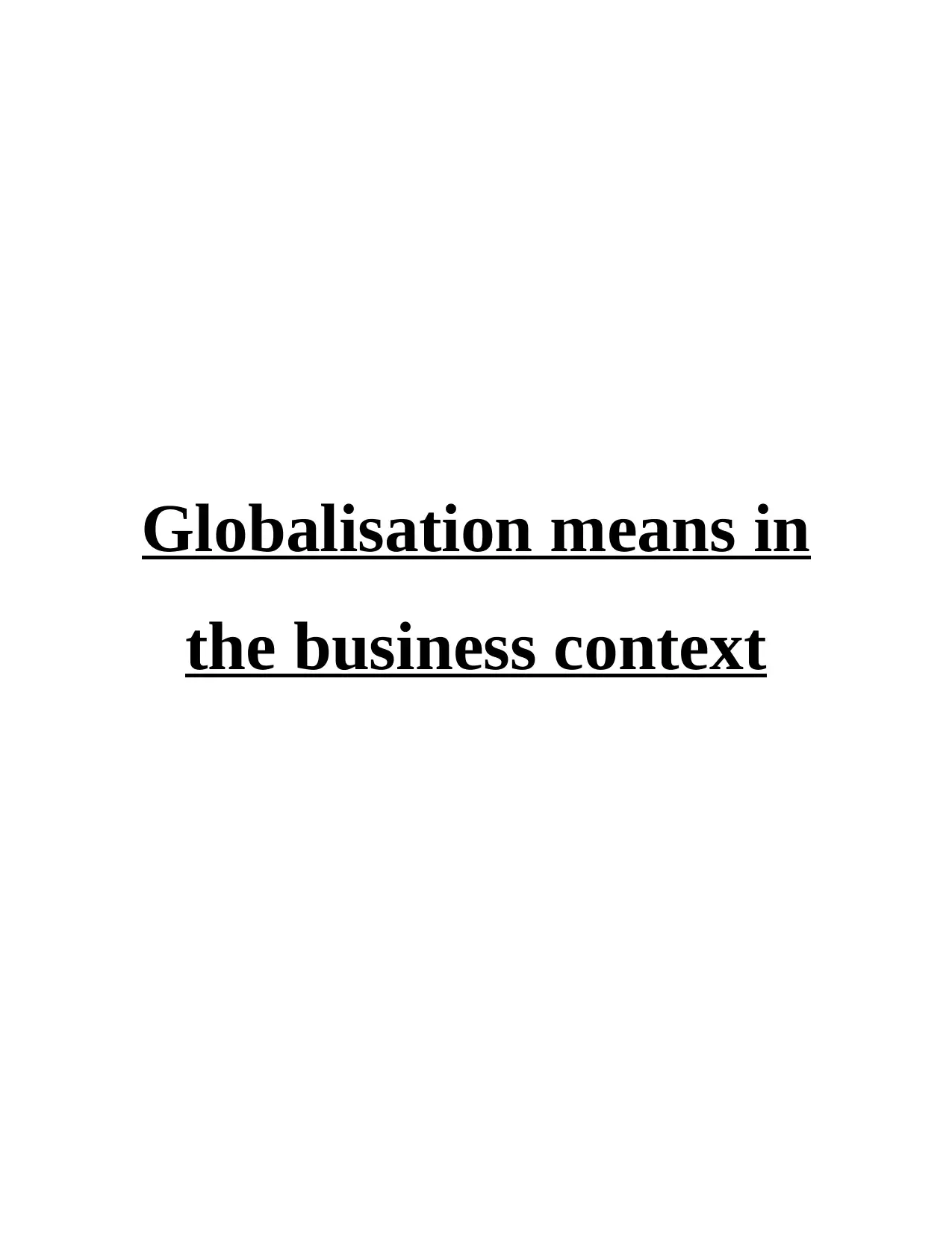
Globalisation means in
the business context
the business context
Paraphrase This Document
Need a fresh take? Get an instant paraphrase of this document with our AI Paraphraser
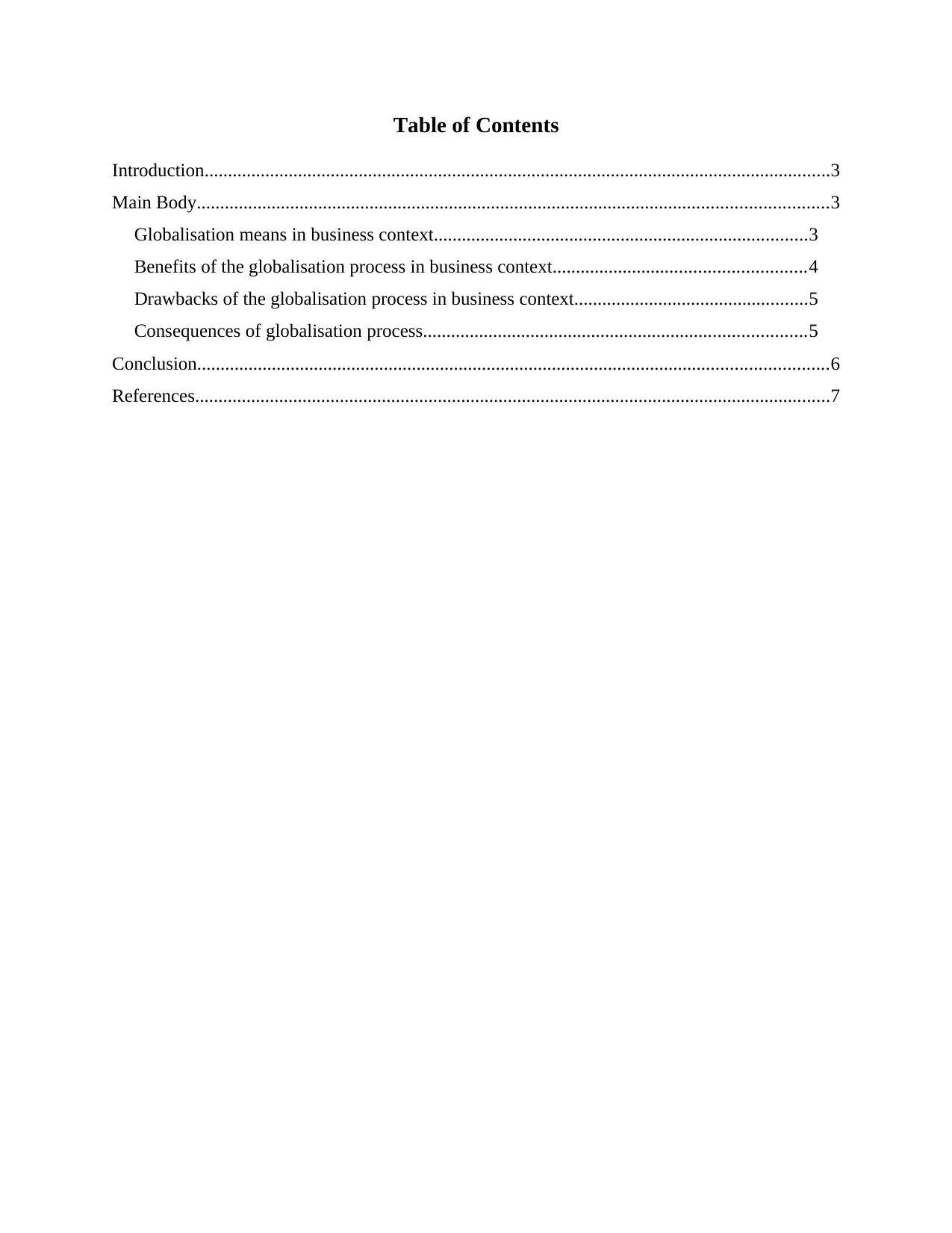
Table of Contents
Introduction......................................................................................................................................3
Main Body.......................................................................................................................................3
Globalisation means in business context................................................................................3
Benefits of the globalisation process in business context......................................................4
Drawbacks of the globalisation process in business context..................................................5
Consequences of globalisation process..................................................................................5
Conclusion.......................................................................................................................................6
References........................................................................................................................................7
Introduction......................................................................................................................................3
Main Body.......................................................................................................................................3
Globalisation means in business context................................................................................3
Benefits of the globalisation process in business context......................................................4
Drawbacks of the globalisation process in business context..................................................5
Consequences of globalisation process..................................................................................5
Conclusion.......................................................................................................................................6
References........................................................................................................................................7
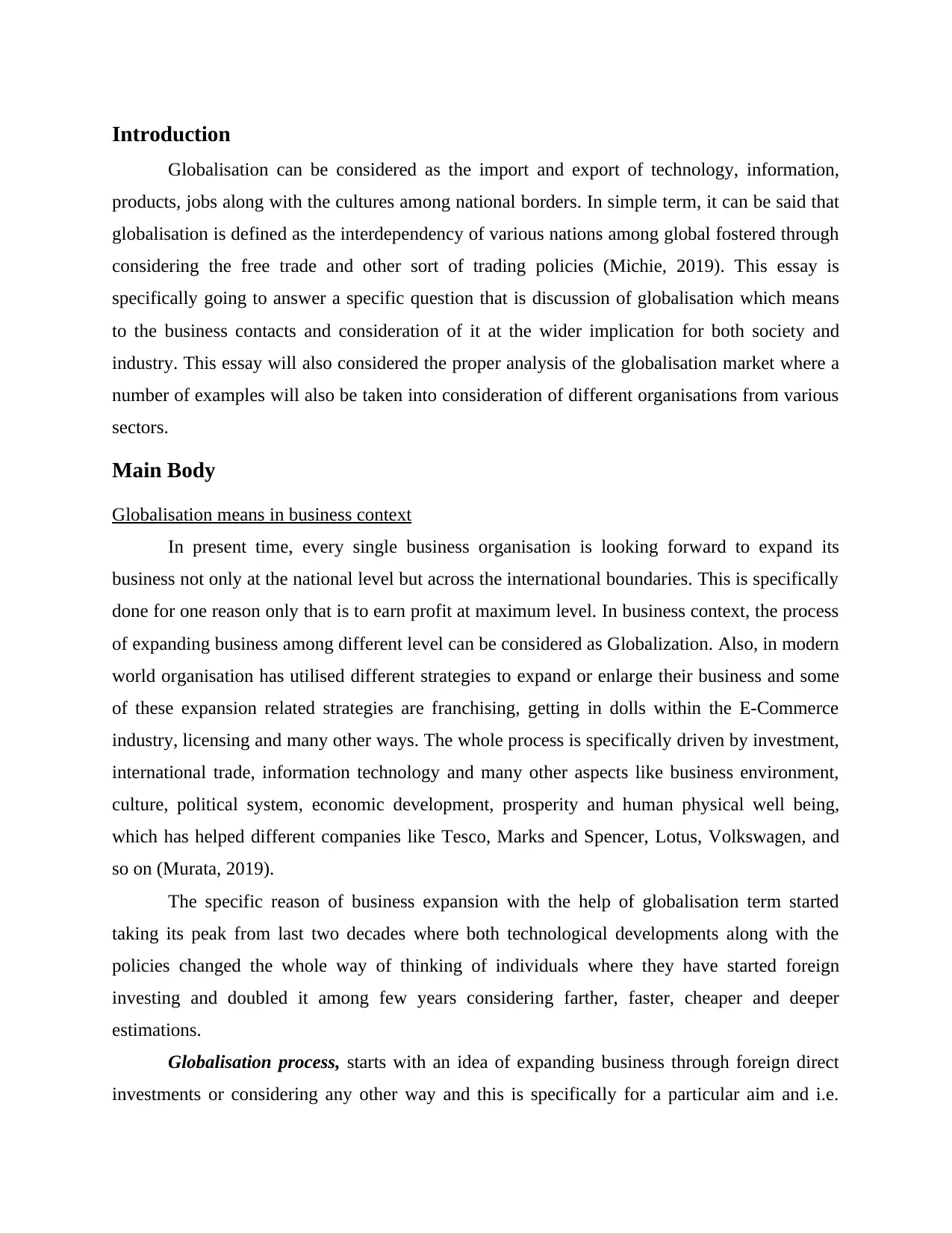
Introduction
Globalisation can be considered as the import and export of technology, information,
products, jobs along with the cultures among national borders. In simple term, it can be said that
globalisation is defined as the interdependency of various nations among global fostered through
considering the free trade and other sort of trading policies (Michie, 2019). This essay is
specifically going to answer a specific question that is discussion of globalisation which means
to the business contacts and consideration of it at the wider implication for both society and
industry. This essay will also considered the proper analysis of the globalisation market where a
number of examples will also be taken into consideration of different organisations from various
sectors.
Main Body
Globalisation means in business context
In present time, every single business organisation is looking forward to expand its
business not only at the national level but across the international boundaries. This is specifically
done for one reason only that is to earn profit at maximum level. In business context, the process
of expanding business among different level can be considered as Globalization. Also, in modern
world organisation has utilised different strategies to expand or enlarge their business and some
of these expansion related strategies are franchising, getting in dolls within the E-Commerce
industry, licensing and many other ways. The whole process is specifically driven by investment,
international trade, information technology and many other aspects like business environment,
culture, political system, economic development, prosperity and human physical well being,
which has helped different companies like Tesco, Marks and Spencer, Lotus, Volkswagen, and
so on (Murata, 2019).
The specific reason of business expansion with the help of globalisation term started
taking its peak from last two decades where both technological developments along with the
policies changed the whole way of thinking of individuals where they have started foreign
investing and doubled it among few years considering farther, faster, cheaper and deeper
estimations.
Globalisation process, starts with an idea of expanding business through foreign direct
investments or considering any other way and this is specifically for a particular aim and i.e.
Globalisation can be considered as the import and export of technology, information,
products, jobs along with the cultures among national borders. In simple term, it can be said that
globalisation is defined as the interdependency of various nations among global fostered through
considering the free trade and other sort of trading policies (Michie, 2019). This essay is
specifically going to answer a specific question that is discussion of globalisation which means
to the business contacts and consideration of it at the wider implication for both society and
industry. This essay will also considered the proper analysis of the globalisation market where a
number of examples will also be taken into consideration of different organisations from various
sectors.
Main Body
Globalisation means in business context
In present time, every single business organisation is looking forward to expand its
business not only at the national level but across the international boundaries. This is specifically
done for one reason only that is to earn profit at maximum level. In business context, the process
of expanding business among different level can be considered as Globalization. Also, in modern
world organisation has utilised different strategies to expand or enlarge their business and some
of these expansion related strategies are franchising, getting in dolls within the E-Commerce
industry, licensing and many other ways. The whole process is specifically driven by investment,
international trade, information technology and many other aspects like business environment,
culture, political system, economic development, prosperity and human physical well being,
which has helped different companies like Tesco, Marks and Spencer, Lotus, Volkswagen, and
so on (Murata, 2019).
The specific reason of business expansion with the help of globalisation term started
taking its peak from last two decades where both technological developments along with the
policies changed the whole way of thinking of individuals where they have started foreign
investing and doubled it among few years considering farther, faster, cheaper and deeper
estimations.
Globalisation process, starts with an idea of expanding business through foreign direct
investments or considering any other way and this is specifically for a particular aim and i.e.
⊘ This is a preview!⊘
Do you want full access?
Subscribe today to unlock all pages.

Trusted by 1+ million students worldwide
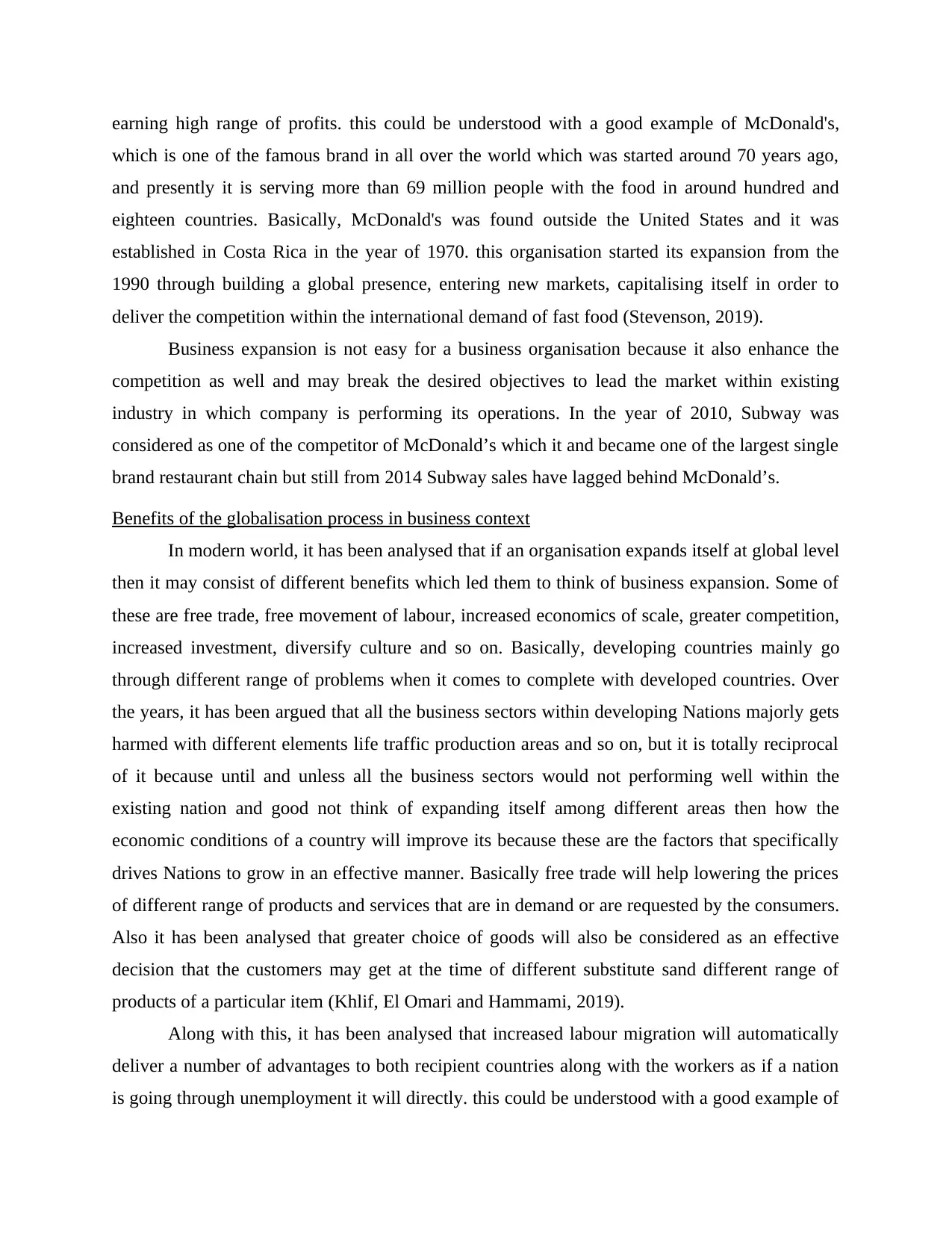
earning high range of profits. this could be understood with a good example of McDonald's,
which is one of the famous brand in all over the world which was started around 70 years ago,
and presently it is serving more than 69 million people with the food in around hundred and
eighteen countries. Basically, McDonald's was found outside the United States and it was
established in Costa Rica in the year of 1970. this organisation started its expansion from the
1990 through building a global presence, entering new markets, capitalising itself in order to
deliver the competition within the international demand of fast food (Stevenson, 2019).
Business expansion is not easy for a business organisation because it also enhance the
competition as well and may break the desired objectives to lead the market within existing
industry in which company is performing its operations. In the year of 2010, Subway was
considered as one of the competitor of McDonald’s which it and became one of the largest single
brand restaurant chain but still from 2014 Subway sales have lagged behind McDonald’s.
Benefits of the globalisation process in business context
In modern world, it has been analysed that if an organisation expands itself at global level
then it may consist of different benefits which led them to think of business expansion. Some of
these are free trade, free movement of labour, increased economics of scale, greater competition,
increased investment, diversify culture and so on. Basically, developing countries mainly go
through different range of problems when it comes to complete with developed countries. Over
the years, it has been argued that all the business sectors within developing Nations majorly gets
harmed with different elements life traffic production areas and so on, but it is totally reciprocal
of it because until and unless all the business sectors would not performing well within the
existing nation and good not think of expanding itself among different areas then how the
economic conditions of a country will improve its because these are the factors that specifically
drives Nations to grow in an effective manner. Basically free trade will help lowering the prices
of different range of products and services that are in demand or are requested by the consumers.
Also it has been analysed that greater choice of goods will also be considered as an effective
decision that the customers may get at the time of different substitute sand different range of
products of a particular item (Khlif, El Omari and Hammami, 2019).
Along with this, it has been analysed that increased labour migration will automatically
deliver a number of advantages to both recipient countries along with the workers as if a nation
is going through unemployment it will directly. this could be understood with a good example of
which is one of the famous brand in all over the world which was started around 70 years ago,
and presently it is serving more than 69 million people with the food in around hundred and
eighteen countries. Basically, McDonald's was found outside the United States and it was
established in Costa Rica in the year of 1970. this organisation started its expansion from the
1990 through building a global presence, entering new markets, capitalising itself in order to
deliver the competition within the international demand of fast food (Stevenson, 2019).
Business expansion is not easy for a business organisation because it also enhance the
competition as well and may break the desired objectives to lead the market within existing
industry in which company is performing its operations. In the year of 2010, Subway was
considered as one of the competitor of McDonald’s which it and became one of the largest single
brand restaurant chain but still from 2014 Subway sales have lagged behind McDonald’s.
Benefits of the globalisation process in business context
In modern world, it has been analysed that if an organisation expands itself at global level
then it may consist of different benefits which led them to think of business expansion. Some of
these are free trade, free movement of labour, increased economics of scale, greater competition,
increased investment, diversify culture and so on. Basically, developing countries mainly go
through different range of problems when it comes to complete with developed countries. Over
the years, it has been argued that all the business sectors within developing Nations majorly gets
harmed with different elements life traffic production areas and so on, but it is totally reciprocal
of it because until and unless all the business sectors would not performing well within the
existing nation and good not think of expanding itself among different areas then how the
economic conditions of a country will improve its because these are the factors that specifically
drives Nations to grow in an effective manner. Basically free trade will help lowering the prices
of different range of products and services that are in demand or are requested by the consumers.
Also it has been analysed that greater choice of goods will also be considered as an effective
decision that the customers may get at the time of different substitute sand different range of
products of a particular item (Khlif, El Omari and Hammami, 2019).
Along with this, it has been analysed that increased labour migration will automatically
deliver a number of advantages to both recipient countries along with the workers as if a nation
is going through unemployment it will directly. this could be understood with a good example of
Paraphrase This Document
Need a fresh take? Get an instant paraphrase of this document with our AI Paraphraser
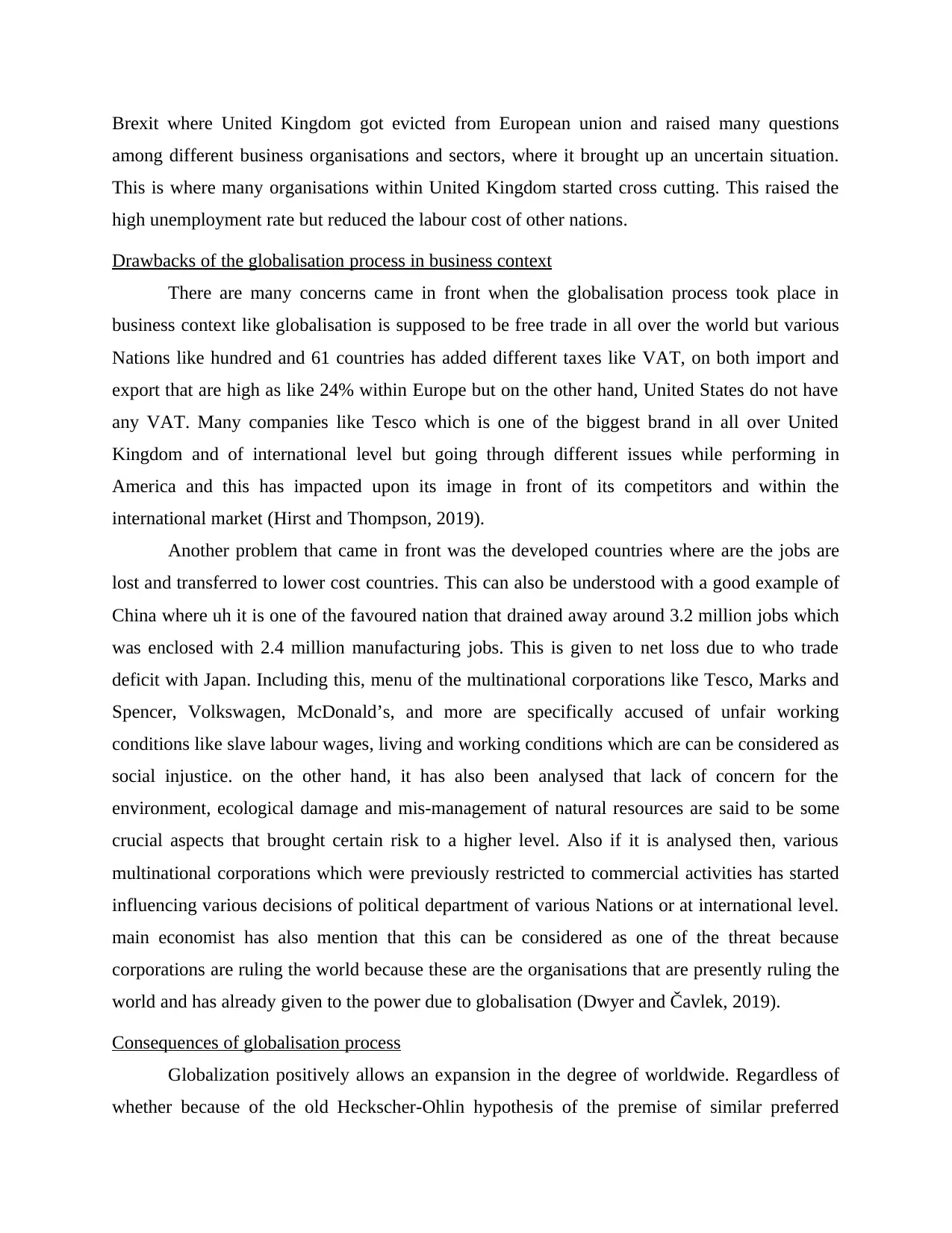
Brexit where United Kingdom got evicted from European union and raised many questions
among different business organisations and sectors, where it brought up an uncertain situation.
This is where many organisations within United Kingdom started cross cutting. This raised the
high unemployment rate but reduced the labour cost of other nations.
Drawbacks of the globalisation process in business context
There are many concerns came in front when the globalisation process took place in
business context like globalisation is supposed to be free trade in all over the world but various
Nations like hundred and 61 countries has added different taxes like VAT, on both import and
export that are high as like 24% within Europe but on the other hand, United States do not have
any VAT. Many companies like Tesco which is one of the biggest brand in all over United
Kingdom and of international level but going through different issues while performing in
America and this has impacted upon its image in front of its competitors and within the
international market (Hirst and Thompson, 2019).
Another problem that came in front was the developed countries where are the jobs are
lost and transferred to lower cost countries. This can also be understood with a good example of
China where uh it is one of the favoured nation that drained away around 3.2 million jobs which
was enclosed with 2.4 million manufacturing jobs. This is given to net loss due to who trade
deficit with Japan. Including this, menu of the multinational corporations like Tesco, Marks and
Spencer, Volkswagen, McDonald’s, and more are specifically accused of unfair working
conditions like slave labour wages, living and working conditions which are can be considered as
social injustice. on the other hand, it has also been analysed that lack of concern for the
environment, ecological damage and mis-management of natural resources are said to be some
crucial aspects that brought certain risk to a higher level. Also if it is analysed then, various
multinational corporations which were previously restricted to commercial activities has started
influencing various decisions of political department of various Nations or at international level.
main economist has also mention that this can be considered as one of the threat because
corporations are ruling the world because these are the organisations that are presently ruling the
world and has already given to the power due to globalisation (Dwyer and Čavlek, 2019).
Consequences of globalisation process
Globalization positively allows an expansion in the degree of worldwide. Regardless of
whether because of the old Heckscher-Ohlin hypothesis of the premise of similar preferred
among different business organisations and sectors, where it brought up an uncertain situation.
This is where many organisations within United Kingdom started cross cutting. This raised the
high unemployment rate but reduced the labour cost of other nations.
Drawbacks of the globalisation process in business context
There are many concerns came in front when the globalisation process took place in
business context like globalisation is supposed to be free trade in all over the world but various
Nations like hundred and 61 countries has added different taxes like VAT, on both import and
export that are high as like 24% within Europe but on the other hand, United States do not have
any VAT. Many companies like Tesco which is one of the biggest brand in all over United
Kingdom and of international level but going through different issues while performing in
America and this has impacted upon its image in front of its competitors and within the
international market (Hirst and Thompson, 2019).
Another problem that came in front was the developed countries where are the jobs are
lost and transferred to lower cost countries. This can also be understood with a good example of
China where uh it is one of the favoured nation that drained away around 3.2 million jobs which
was enclosed with 2.4 million manufacturing jobs. This is given to net loss due to who trade
deficit with Japan. Including this, menu of the multinational corporations like Tesco, Marks and
Spencer, Volkswagen, McDonald’s, and more are specifically accused of unfair working
conditions like slave labour wages, living and working conditions which are can be considered as
social injustice. on the other hand, it has also been analysed that lack of concern for the
environment, ecological damage and mis-management of natural resources are said to be some
crucial aspects that brought certain risk to a higher level. Also if it is analysed then, various
multinational corporations which were previously restricted to commercial activities has started
influencing various decisions of political department of various Nations or at international level.
main economist has also mention that this can be considered as one of the threat because
corporations are ruling the world because these are the organisations that are presently ruling the
world and has already given to the power due to globalisation (Dwyer and Čavlek, 2019).
Consequences of globalisation process
Globalization positively allows an expansion in the degree of worldwide. Regardless of
whether because of the old Heckscher-Ohlin hypothesis of the premise of similar preferred
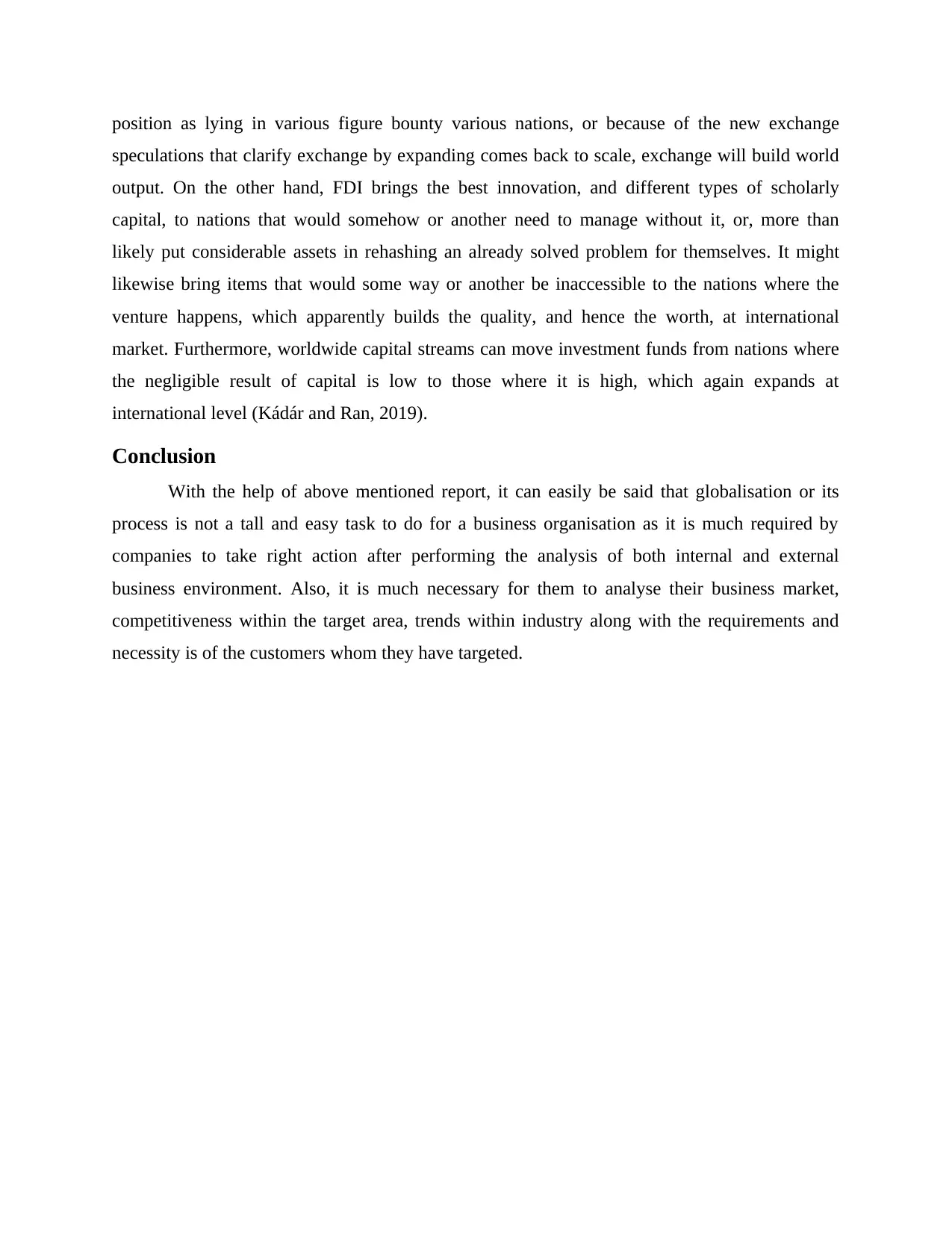
position as lying in various figure bounty various nations, or because of the new exchange
speculations that clarify exchange by expanding comes back to scale, exchange will build world
output. On the other hand, FDI brings the best innovation, and different types of scholarly
capital, to nations that would somehow or another need to manage without it, or, more than
likely put considerable assets in rehashing an already solved problem for themselves. It might
likewise bring items that would some way or another be inaccessible to the nations where the
venture happens, which apparently builds the quality, and hence the worth, at international
market. Furthermore, worldwide capital streams can move investment funds from nations where
the negligible result of capital is low to those where it is high, which again expands at
international level (Kádár and Ran, 2019).
Conclusion
With the help of above mentioned report, it can easily be said that globalisation or its
process is not a tall and easy task to do for a business organisation as it is much required by
companies to take right action after performing the analysis of both internal and external
business environment. Also, it is much necessary for them to analyse their business market,
competitiveness within the target area, trends within industry along with the requirements and
necessity is of the customers whom they have targeted.
speculations that clarify exchange by expanding comes back to scale, exchange will build world
output. On the other hand, FDI brings the best innovation, and different types of scholarly
capital, to nations that would somehow or another need to manage without it, or, more than
likely put considerable assets in rehashing an already solved problem for themselves. It might
likewise bring items that would some way or another be inaccessible to the nations where the
venture happens, which apparently builds the quality, and hence the worth, at international
market. Furthermore, worldwide capital streams can move investment funds from nations where
the negligible result of capital is low to those where it is high, which again expands at
international level (Kádár and Ran, 2019).
Conclusion
With the help of above mentioned report, it can easily be said that globalisation or its
process is not a tall and easy task to do for a business organisation as it is much required by
companies to take right action after performing the analysis of both internal and external
business environment. Also, it is much necessary for them to analyse their business market,
competitiveness within the target area, trends within industry along with the requirements and
necessity is of the customers whom they have targeted.
⊘ This is a preview!⊘
Do you want full access?
Subscribe today to unlock all pages.

Trusted by 1+ million students worldwide
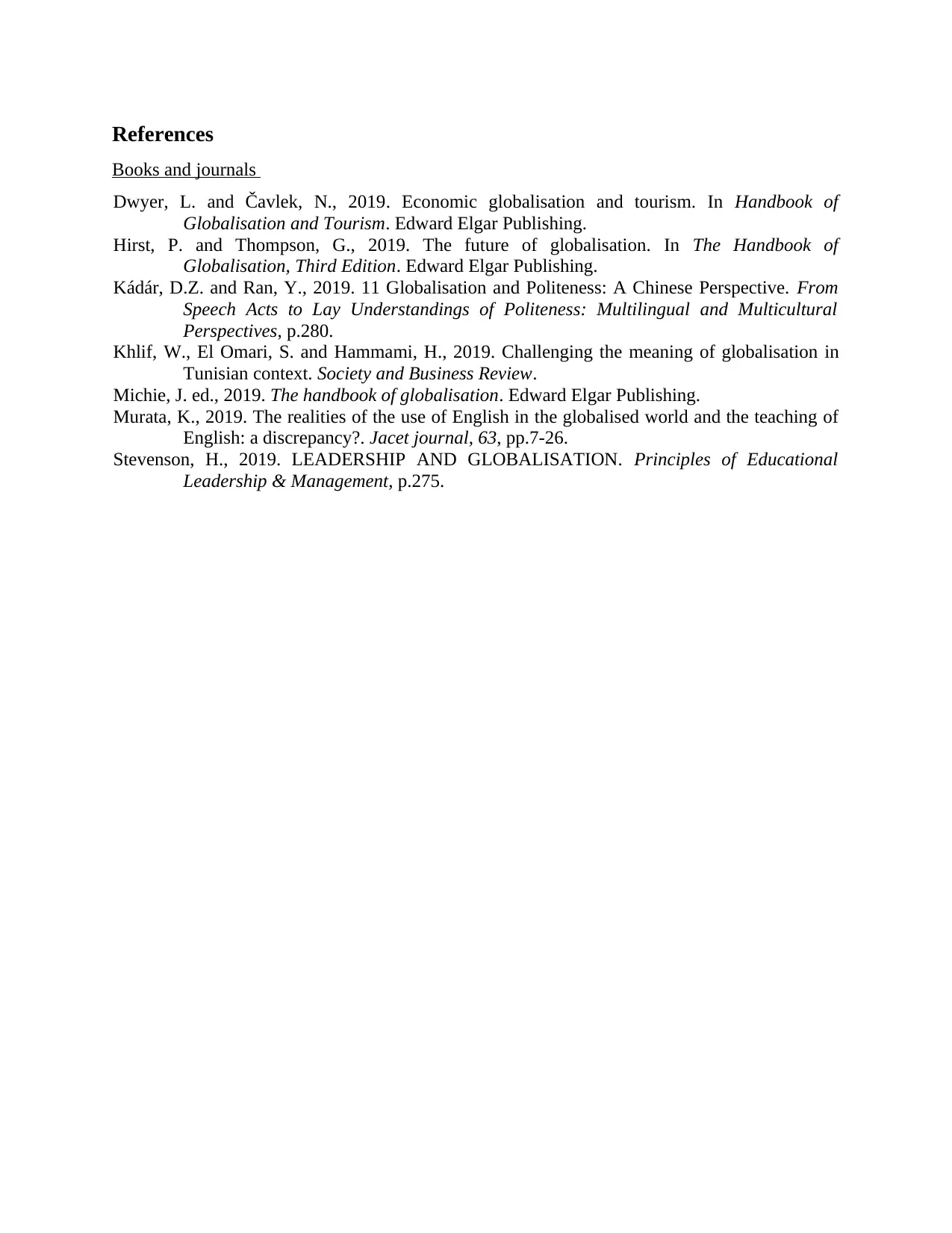
References
Books and journals
Dwyer, L. and Čavlek, N., 2019. Economic globalisation and tourism. In Handbook of
Globalisation and Tourism. Edward Elgar Publishing.
Hirst, P. and Thompson, G., 2019. The future of globalisation. In The Handbook of
Globalisation, Third Edition. Edward Elgar Publishing.
Kádár, D.Z. and Ran, Y., 2019. 11 Globalisation and Politeness: A Chinese Perspective. From
Speech Acts to Lay Understandings of Politeness: Multilingual and Multicultural
Perspectives, p.280.
Khlif, W., El Omari, S. and Hammami, H., 2019. Challenging the meaning of globalisation in
Tunisian context. Society and Business Review.
Michie, J. ed., 2019. The handbook of globalisation. Edward Elgar Publishing.
Murata, K., 2019. The realities of the use of English in the globalised world and the teaching of
English: a discrepancy?. Jacet journal, 63, pp.7-26.
Stevenson, H., 2019. LEADERSHIP AND GLOBALISATION. Principles of Educational
Leadership & Management, p.275.
Books and journals
Dwyer, L. and Čavlek, N., 2019. Economic globalisation and tourism. In Handbook of
Globalisation and Tourism. Edward Elgar Publishing.
Hirst, P. and Thompson, G., 2019. The future of globalisation. In The Handbook of
Globalisation, Third Edition. Edward Elgar Publishing.
Kádár, D.Z. and Ran, Y., 2019. 11 Globalisation and Politeness: A Chinese Perspective. From
Speech Acts to Lay Understandings of Politeness: Multilingual and Multicultural
Perspectives, p.280.
Khlif, W., El Omari, S. and Hammami, H., 2019. Challenging the meaning of globalisation in
Tunisian context. Society and Business Review.
Michie, J. ed., 2019. The handbook of globalisation. Edward Elgar Publishing.
Murata, K., 2019. The realities of the use of English in the globalised world and the teaching of
English: a discrepancy?. Jacet journal, 63, pp.7-26.
Stevenson, H., 2019. LEADERSHIP AND GLOBALISATION. Principles of Educational
Leadership & Management, p.275.
1 out of 7
Related Documents
Your All-in-One AI-Powered Toolkit for Academic Success.
+13062052269
info@desklib.com
Available 24*7 on WhatsApp / Email
![[object Object]](/_next/static/media/star-bottom.7253800d.svg)
Unlock your academic potential
Copyright © 2020–2025 A2Z Services. All Rights Reserved. Developed and managed by ZUCOL.




